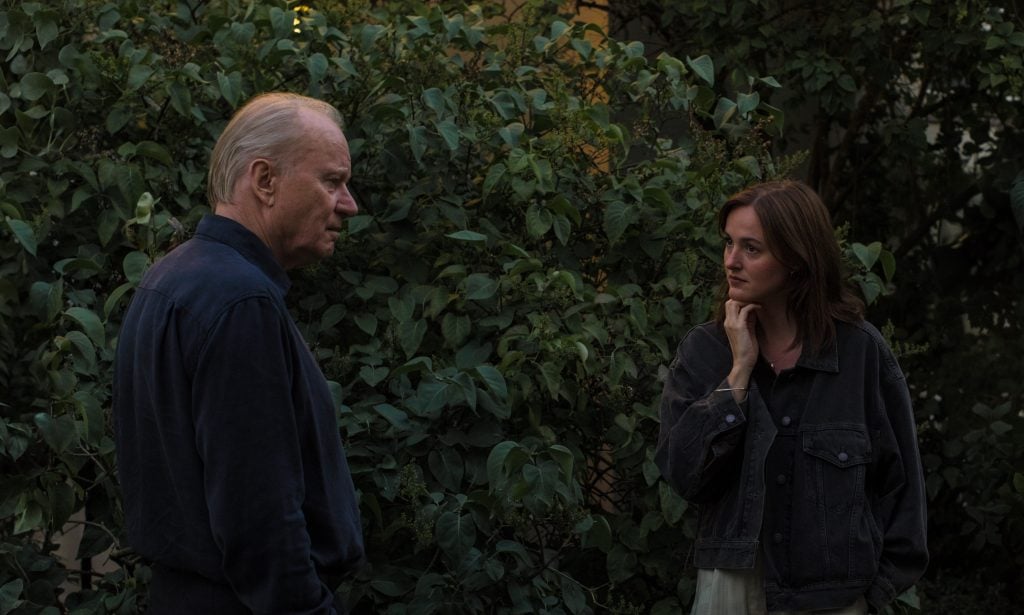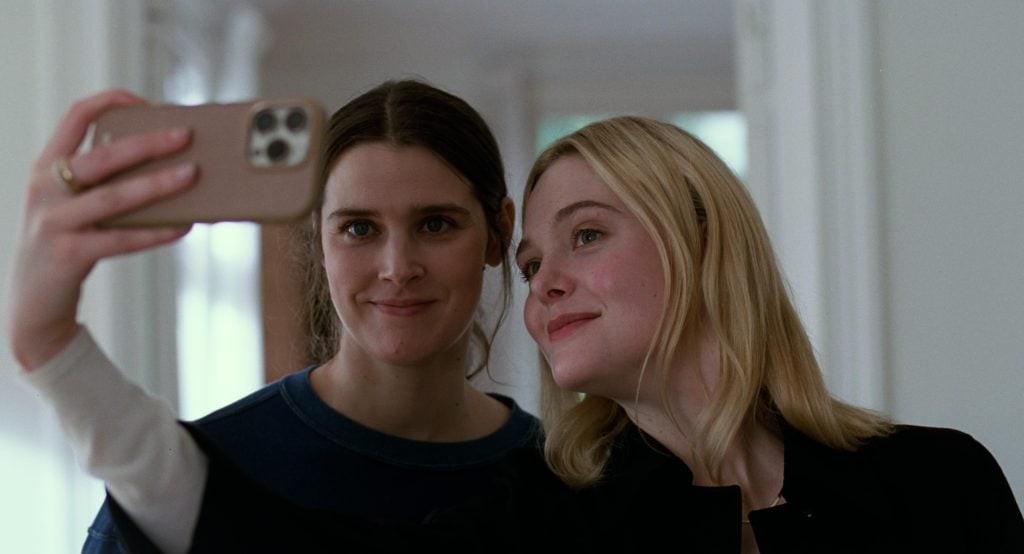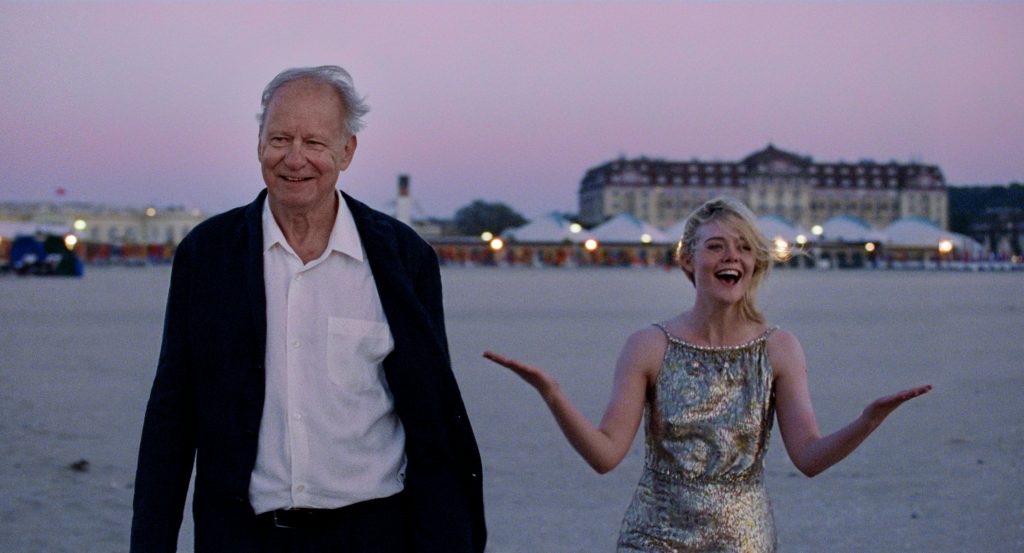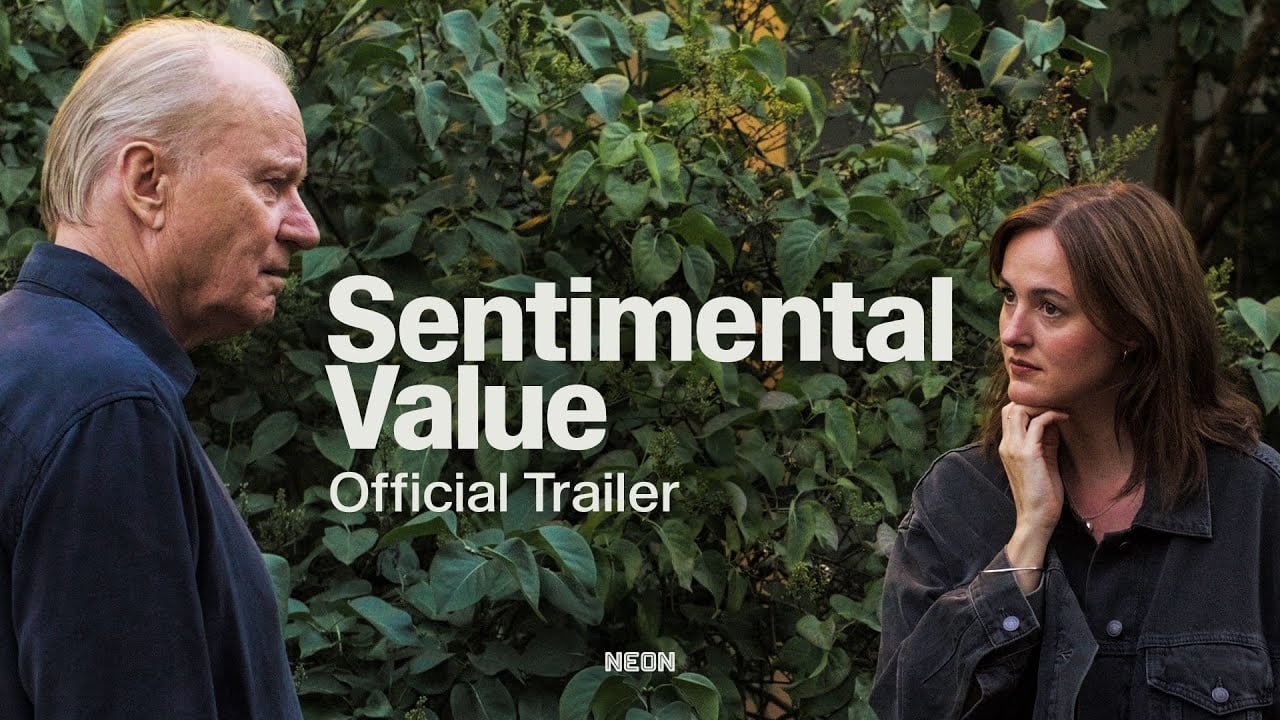For those who possess a passing familiarity with Joachim Trier’s filmography, especially his 2021 masterpiece The Worst Person in the World, it’s not much of a surprise when one of his pictures is littered with needle drops from the 1960s, ‘70s, and ‘80s. In Worst Person, Harry Nilsson was a usual suspect; “I Said Goodbye to Me” and “I Will Take You There” were pivotal to charting its main character’s journey through young adulthood, from one lover and/or occupation to the next. When Julie (played by Renate Reinsve) decides to become a photographer rather than continue her post-grad education in medicine and psychology, Christopher Cross’ “Ride Like the Wind” blares. “I’ve got to ride, ride like the wind, “ he sings, “to be free again.” When the film concludes with Julie realizing that her life may be best lived as the person who captures beautiful moments for others rather than enjoying them herself, Art Garfunkel’s recording of Antônio Carlos Jobim’s “Waters of March” wipes our tears. “It’s the wind blowing free, it’s the end of a slope,” he croons with the tone of a man reading the final lines of a tragicomic story. “It’s a beam, it’s a void, it’s a hunch, it’s a hope.”
On paper, the use of these songs feels obvious, even manipulative; there are few things worse than a filmmaker using someone else’s art, specifically music, to drive home the meaning of their own. But Trier is self-aware enough to know that his films should carry more weight than the tunes he chooses to sprinkle throughout his final cut, and given how much emotional resonance he and longtime co-writer Eskil Vogt tend to pack into their scripts, these tracks serve as accompaniments, perhaps even as extensions of a film’s more traditional score. “I’m establishing a language of music in [Worst Person] early on that this is going to be like a playlist,” Trier told Variety in 2022. The film’s music supervisor, Goran Obad, noted that he and Trier “wanted music with the duality of being singable but also reflective of a deeper state and experience, which is the topic of the movie.”
Apart from employing Martin Hossbach in the role of music supervisor as opposed to Obad, Trier’s latest triumph, Sentimental Value, is no different in this regard. Terry Callier’s 1972 epic “Dancing Girl” is a recurring play throughout the runtime, a poem telling a story unto itself, but one that serves Trier, Vogt, and co. quite well. The same goes for Labi Siffre’s “Cannock Chase,” perhaps the film’s best selection (though there are plenty to choose from). The British musician’s hopeful number sings of hard times and painful memories, but more than that, it teases the peace that lies beyond the storm. “I’ve been down for oh, so long,” he sings. “It seemed like my soul was dead and gone. But it’s alright… I’m back in the fight.” Just one line later, he cries, “I thought my day would never come. Maybe it won’t, but I’ll have fun… And I’ll hold tight, ‘cause that way it might.”

In what probably is yet hardly feels like much of a coincidence, the album from which that Siffre song was pulled is called Crying Laughing Loving Lying. Had Sentimental Value already been taken, that title may have befit Trier’s dramedy, the tale of a family that does a whole lot of all four. Gustav Borg (Stellan Skarsgård) tends to be laughing or lying; he’s spent most of his midlife years receiving acclaim for his filmmaking and being an absent dad to his daughters, Nora (Reinsve) and Agnes (Inga Ibsdotter Lilleaas), who have done their fair share of laughing and lying, but oftentimes find themselves attempting to love someone despite their decisions and flaws or crying because of them. Trier’s film begins with a detailed prologue focused on the Borg family home – Nora viewed as a living organism when she was little, with the crack in its foundation proving significant beyond its appearance as she aged – where the sisters were raised, where their late mother lived until she passed, and to which their father has recently returned with an offer.
Gustav wants Nora (an actor) to star in his next film, a semiautobiographical drama about his own childhood, and to play a stand-in for his mother, who took her own life one morning after sending him off to school. When Nora flat-out rejects her father’s proposition without so much as entertaining his first script in 15 years, he jets off to the Deauville Film Festival, where a retrospective of his work is being showcased. One particularly early film of his, which stars a young Nora, deeply moves Rachel Kemp (Elle Fanning), a Hollywood starlet whose face is as luminous on the big screen as it is in makeup ads that plaster billboards all across the world. Half of you will expect that her instant connection to Gustav’s storytelling might inspire a romantic diversion, but the better half of you knows that Trier is far more interested in how this newfound working relationship will impact the personal ones that Gustav’s estrangement has frayed. And so, Gustav casts Kemp in the part he wrote for Nora, a decision that further complicates the already-strained bond between father and daughter, and separately amplifies some burgeoning resentments hidden between Nora and Agnes.

What unfolds from there is, of course, better witnessed than described, a trait that goes for any film, but particularly for those co-written and directed by Trier, a master of the form that doesn’t commit to plot mechanics as much as he operates with exploration of humanity in mind. His sixth feature wrestles with devastation and hilarity as it maintains the ability to be broadly incisive and specifically crafted. It also exists as both an intimate story about family and a clever movie about filmmaking. With the latter element, he waits until Sentimental Value’s final moments to depict the physical act of making a movie, spending the rest of the time depicting some behind-the-scenes work – including an exquisite sequence involving a homemade table read where Fanning delivers the best acting of her career in a matter of minutes – but mainly focusing on how a man consumed by creativity can only think to rebuild his relationship with his daughter through that painstaking process.
When Gustav says to both Nora and Agnes, “You’re not going to write Ulysses while driving to soccer practice,” he’s hardly apologizing for his absence when they were kids, but this excuse, baked into such a dynamite-lined nugget of parental experience, is his best stab at the concept. In an interview with Vulture, Trier acknowledged the challenging nature of the idea: “To create free art, you need some sense of removedness from certain codes of behavior… On the other hand, I get encouraged to make movies from being in life and not removing myself from it.” That this sensibility has been evident over the course of his career – even in darker projects like Louder Than Bombs and Thelma – is an achievement unto itself, and though no parent should receive credit for “being there,” as it were, it’s reasonable to note that Trier, a father of two, has made it a priority to do “50,000 things in one day and trying to get home quick.” He may not be writing Ulysses, but he’s consistently crafting exhaustive portraits of complex people and the relationships that define them, for better or for worse.

Whether or not Trier’s children play soccer doesn’t matter so much, just as the fact that Sentimental Value holds no backbreaking twists in its pocket doesn’t sour the taste of a somewhat straightforward narrative. It’s the tact with which Trier and Vogt examine interiority and the act of processing that defines this collaboration and somehow elevates it beyond what the duo has sketched in years past. Perhaps they were always meant to take on a complete-ish family unit as opposed to the more singular character studies they’ve taken on in films like Worst Person and their excellent second film, Oslo, August 31. With a never-better Skarsgård as their patriarch, their film is afforded plenty of room to dissect not just how professional desires can get in the way of personal obligation (insofar as that’s how Gustav viewed his role as a father), but it’s once again Reinsve owns the show from the opening frame. (It was never going to be anyone’s to steal.) A generational talent playing a talent haunted by generational trauma, she’s what anchors Sentimental Value from becoming, well, too sentimental. Her Nora is a tough nut to crack, even though every single crack is visible, plain as day.
But quite like the foundational rift that has been inching up the side of her childhood home for centuries, those that have endured within the Borg family have somehow never caused the framework that holds them together to crumble. That’s an easy enough idea to apply to houses, families, and art, and one that Sentimental Value never shies away from exploiting as a primary source of emotion and beauty. As long as something or someone wants to keep their shared love alive, it won’t go anywhere, even if it’s not in the same form it once took.
Sentimental Value held its New York Premiere as part of the Main Slate section at the 2025 New York Film Festival. The film will debut in select theaters on November 7, 2025, courtesy of NEON.
Director: Joachim Trier
Writers: Joachim Trier, Eskil Vogt
Rated: NR
Runtime: 134m

Joachim Trier, a master of the form, reunites with Renate Reinsve for a revelatory portrait of a family navigating grief and forgiveness.
-
GVN Rating 9.5
-
User Ratings (0 Votes)
0
Will Bjarnar is a writer, critic, and video editor based in New York City. Originally from Upstate New York, and thus a member of the Greater Western New York Film Critics Association and a long-suffering Buffalo Bills fan, Will first became interested in movies when he discovered IMDb at a young age; with its help, he became a voracious list maker, poster lover, and trailer consumer. He has since turned that passion into a professional pursuit, writing for the film and entertainment sites Next Best Picture, InSession Film, Big Picture Big Sound, Film Inquiry, and, of course, Geek Vibes Nation. He spends the later months of each year editing an annual video countdown of the year’s 25 best films. You can find more of his musings on Letterboxd (willbjarnar) and on X (@bywillbjarnar).






